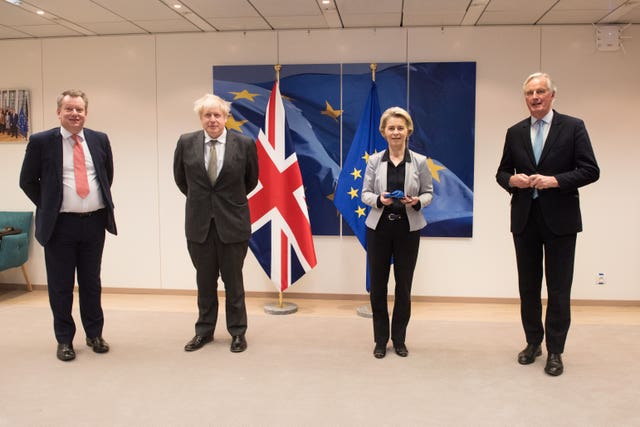Brussels steps up no-deal planning as deadline on UK-EU trade talks looms
Negotiations on a trade deal are expected to conclude one way or the other at the end of the weekend.

Talks on a post-Brexit trade deal are unlikely to be extended beyond Sunday unless the European Union drops some of its key demands, Foreign Secretary Dominic Raab said.
Boris Johnson and European Commission president Ursula von der Leyen agreed that a decision on the future of the negotiations will be taken by the end of the weekend.
With the prospect of a no-deal outcome, Brussels has stepped up its preparations and held out the prospect of emergency agreements aimed at keeping planes flying and lorries crossing to the Continent.
One of the contingency measures proposed by Mrs von der Leyen is for EU fishing boats to continue to enjoy access to UK waters during 2021, an area which has been one of the main sticking points in the trade negotiations.
Following Wednesday night’s meeting between the Prime Minister and Mrs von der Leyen, Mr Raab told the BBC on Thursday that, while he could not rule out a further extension in the talks process, it is important to have “finality”.
He said: “I think it’s unlikely but I can’t categorically exclude it.”
The Cabinet minister added that there has not been “enough pragmatism and flexibility on the EU side” and called for “substantial movement” from the bloc in order to seal a deal before the weekend is out.
Penny Mordaunt, a minister in the Cabinet Office, said the UK would continue negotiating until the last.
Answering an urgent question in the Commons, she said: “We are going to do everything we can to secure a deal.
“We will carry on negotiating in talks until there is no hope of that happening, but at the moment there is hope of that happening, even though things do appear gloomy.”
Mrs von der Leyen set out EU contingency plans for a series of mini-deals with time running out for the trade talks to reach a conclusion.
The UK leaves the bloc’s single market and customs union at the end of the year and without a comprehensive deal there could be major disruption to trade.
The commission president said: “Negotiations are still ongoing. However, given that the end of the transition is very near, there is no guarantee that, if and when an agreement is found, it can enter into force on time.
“Our responsibility is to be prepared for all eventualities, including not having a deal in place with the UK on January 1 2021.
“That is why we are coming forward with these measures today.”
UK chief negotiator Lord Frost and his EU counterpart, Michel Barnier, will reconvene in Brussels on Thursday to begin their final push to salvage what has been almost a year of wrangling over a trade deal.
After the leaders’ three-hour dinner, a Number 10 source said it was unclear whether the divide between Brussels and the UK could be bridged.
“The PM does not want to leave any route to a possible deal untested,” said the source, as negotiators were given a fresh mandate to thrash out a deal before transitional trading arrangements end on December 31.
Mrs von der Leyen called the conversation with Mr Johnson “lively and interesting” but stressed their positions remain “far apart”.

The German politician is expected to debrief the leaders of the 27 member countries on the state of play with the negotiations when they gather for a European Council summit on Thursday.
Negotiations have faltered on fishing rights, the level playing field – measures aimed at preventing the UK undercutting the EU on standards and state subsidies – and the way that any deal would be governed.
Mr Raab said the UK has already moved in agreeing to a transition period to allow European trawlermen to adjust to changes in fishing rights, but argued that the EU is asking too much when it comes to level playing field arrangements.
“What we’re not going to be treated is in a way that no other country would accept, and nor would the EU accept,” he told BBC Radio 4’s Today programme.
“It’s about some basic respect for democratic principles.”
The Office for Budget Responsibility has suggested that a no-deal outcome could wipe 2% off gross domestic product, a measure of the size of the economy, in 2021.
The pound slid to a two-week low against the dollar on Thursday morning after the talks between Mr Johnson and Mrs von der Leyen failed to produce a decisive breakthrough.
By 9.30am the pound was down 0.8% against the dollar and 0.97% against the euro.
Connor Campbell, a financial analyst at SpreadEx, said: “Sterling took little comfort from the announcement of a new – and, this time, likely permanent – Brexit deadline.”





